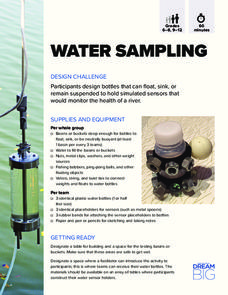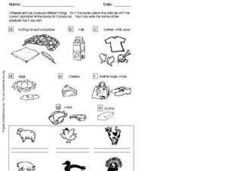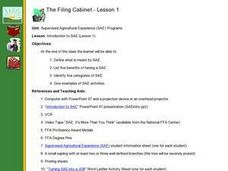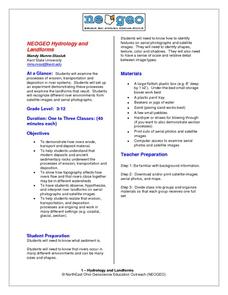Mr. E. Science
Motion
An informative presentation covers motion, metric system, conversions, graphing of coordinates and lines, speed, velocity, and acceleration problems, as well as mean calculations. This is the first lesson in a 26-part series.
American Chemical Society
Does Temperature Affect Dissolving?
When making sweet tea, why do people dissolve the sugar in hot tea instead of cold tea? The class discusses the previous lab and builds upon it. Working in groups, they design an experiment to determine how temperature affects the...
Saskatoon Health Region
Bulletin Board Ideas: Germs
Wash those germs right off of your hands! Create a germs awareness bulletin board that showcases the importance of hand washing. Have class members trace their hands and write when it is most important to hand wash. Or, create the What...
National Institute of Open Schooling
Radioactive Pollution
Radioactive pollutants can enter the body through ingestion, inhalation, absorption, or injection. The last lesson in a series of 36 introduces pupils to radioactive pollution. They study its sources, both natural and man-made, its...
National Wildlife Federation
Hot, Hotter, Hottest: Extreme Weather's Impact on Our Resources
How dry is it? It's so dry, the river only runs twice a week! Through an analysis of maps and discussions, pairs learn about droughts across the United States in the ninth of 12 lessons. They then read about, answer questions, analyze...
DiscoverE
Water Sampling
What is the best way to test water quality? Using plastic bottles, scholars create monitoring sensors to test water quality. Creating three different sensors allows individuals to measure water quality at different water levels.
iCivics
Step One: We've Got Issues
What is the most pressing issue in your community? The resource helps you and your middle schoolers begin the process of doing something about it! Learners compare and contrast two pressing issues in their local counties by reading two...
DocsTeach
Environmental Case Study: Hetch Hetchy Valley
What is more important: building a new school or preserving a nature reserve? Keeping a natural area clean or providing clean drinking water to a city of millions? Young scholars weigh these questions—almost literally—using an...
Curated OER
What is Photosynthesis?
Young scholars study the plant process of photosynthesis through multiple activities. In this photosynthesis lesson plan, students make a graphic organizer, complete a science observation, and make a plant ID book to learn about the...
Curated OER
What is Life?
Students investigate living and non-living organisms/objects foudn around the school in this technology-based science lesson. Adjustments to the lesson can be made based upon technological limitations.
Curated OER
What is Produced from Animals?
In this animal and alphabet fill in the blank worksheet, students fill in the blanks below animals with the letter of the alphabet that is beside the pictures of products made from those animals.
Curated OER
What is Sound?
Second graders discuss sound and describe them. In this investigative lesson students observe sound through their eyes, bodies and ears.
Curated OER
What Is El Niño?
Students access information at remote sites using telecommunications, identify impacts by reviewing past El Ni??o events, make and use scale drawings, maps, and maps symbols to find locations and describe relationships.
Curated OER
Lab Safety
Students review lab safety by walking into a classroom full of hazards and discussing what is wrong as they clean each station up.
Curated OER
Series and Parallel Circuits
Electricians draw four different circuits and answer questions about the resistance, voltage drop, and current at different points in each. Completing this activity will help make sure that your class is understanding what is happening...
Curated OER
Breathing
When learning about the respiratory system, how do learners know what is important? One way is to use a self-assessment or study like the one found here. While the formatting could use some work, the concepts are solid. Depending on your...
Will Steger Foundation
The Carbon Cycle - What are its Implications for Climate Policy?
The carbon cycle isn't a bike which produces carbon and this lesson explains why. Through reading and discussion, groups of pupils create visual explanations of the four parts of the carbon dioxide oxygen cycle. Activities...
Curated OER
The Filing Cabinet - Lesson 1
Students explore and define what is meant by Supervised Agricultural Experience is and list five benefits of having it. They identify five categories of Supervised Agricultural Experience and supply a wealth of examples. Each student...
Curated OER
The Filing Cabinet
Students discuss and identify the job market in agriculture. They define what is meant by Exploratory SAE and list five possible opportunities in the local community. Finally, students differentiate between improvement and supplementary...
Curated OER
Orbits Worksheet #1
A diagram of Earth's path around the sun, including the position of the moon, is displayed at the top of the instructional activity. Five multiple questions get astronomers to analyze the diagram considering what is going on in the solar...
Curated OER
Deserts
What is it like in the desert? Inform your class on what makes a desert, the type of climate they'll find there, and the interesting plant and animals that live in the desert environment. This is a text-rich presentation that will...
NorthEast Ohio Geoscience Education Outreach
Hydrology and Landforms
Three days of erosion exploration await your elementary geologists. Learners begin by examining rivers via Google Earth, then they model water flow in sand, and finally, they identify resulting landforms. This lesson is written...
Curated OER
Are Our Chemical Measurements Accurate or Precise?
What is the difference between accuracy and precision? This activity has students define the terms accuracy and precision, and compare bulleye diagrams to find examples of both. Students analyze given data and determine the accuracy and...
Curated OER
Electrical Safety
Teaching our kids to stay safe always begins by explaining what is dangerous and why. Encourage electrical safety with seven fundamental rules related to safe handling of electrical equipment, cords, and self-awareness. Great for...
Other popular searches
- What Is Science Important
- What Is Science Worksheets
- Science What Is Science
- What Is Science Fiction
- What Is Science Worhsheets
- What Is a Science Theory
- What Is Science Skills?
- What Is Science Florida
- Science What Is a Rock?























